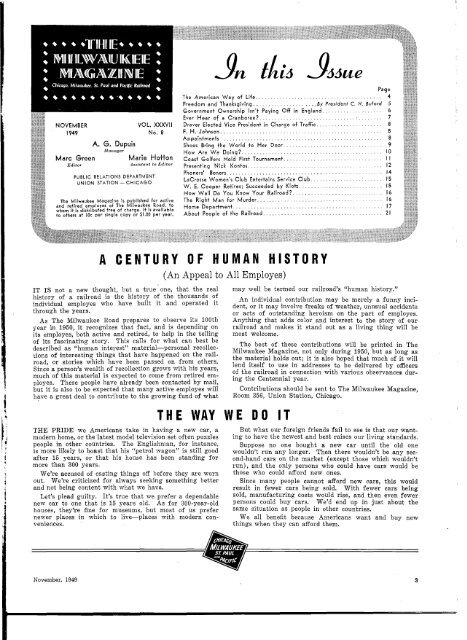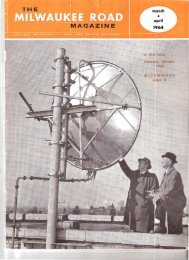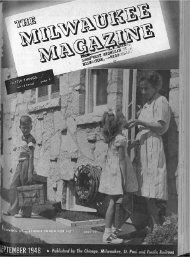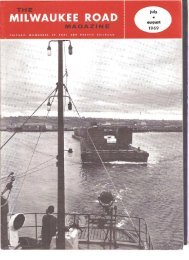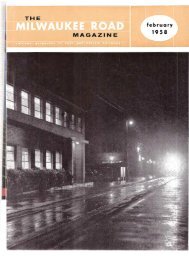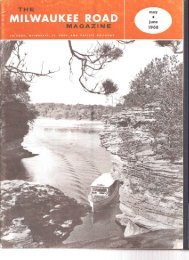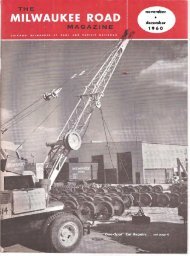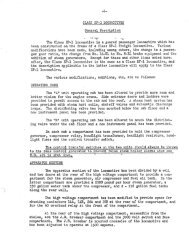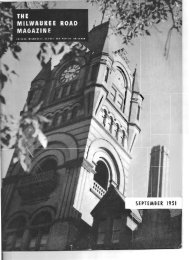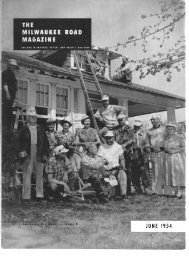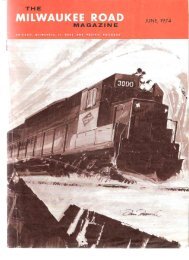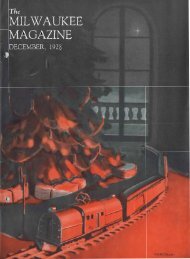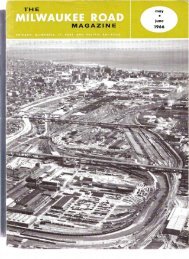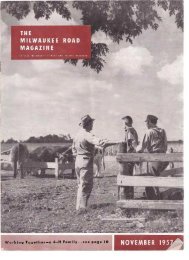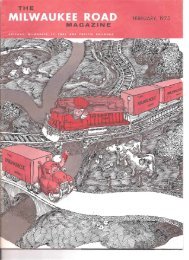November, 1949 - Milwaukee Road Archive
November, 1949 - Milwaukee Road Archive
November, 1949 - Milwaukee Road Archive
Create successful ePaper yourself
Turn your PDF publications into a flip-book with our unique Google optimized e-Paper software.
.!l.J:Jue<br />
Page<br />
The America n Way of Life. . . . . . . . . . . . . . . . 4<br />
Freedom and Thanksgiving. . . . .. By Presidenf C. H. Bulor'" 5<br />
Government Ownership Isn't Paying Off in England. 6<br />
Ever Hear of a Cranboree? 7<br />
NOVEMBER VOL. XXXVII Draver Elected Vice President in Charge of Traffic. 8<br />
<strong>1949</strong> No.8 F. H. Johnson. . . . . . . . . . . . 8<br />
A. G. Dupuis<br />
Appointments<br />
8<br />
Shoes Bring the World to Her Door.<br />
9<br />
Marc Green<br />
.iUanager<br />
How Are We Doing? .........<br />
10<br />
Marie Hotton Coast Golfers Hold First Tournament. . .<br />
II<br />
Ellitor' Assistant to Editor<br />
Presenting Nick Kontos.......... 12<br />
Phoners' Boners..... . . . . . . . . . . . . . . . . . . . . . . . . . . . . . 14<br />
PUBLIC RELATIONS DEPARTMENT<br />
LaCrosse Women's Club Entertains Service Club.<br />
15<br />
UNION STATION - CHICAGO<br />
W. E. Cooper Retires~ Succeeded by Klotz.<br />
15<br />
How Well Do You Know Your Railroad? 16<br />
The <strong>Milwaukee</strong> Magazine is published for active The Right Man for Murder... . . . . . . . . . . . . . . . . . . . 16<br />
and retired employes of The <strong>Milwaukee</strong> <strong>Road</strong>, to Home Department. . . . . . . . . . . . . . . . . . . . . . . . . . . . . . . . . . . . . . . . .<br />
17<br />
whom it is distributed free of charge. It is available<br />
to others at 10c per single copy or $1.00 per year. About People of the Railroa d. . . . . . . . . . . . . . . . . . . . . . . . . . . . . .<br />
21<br />
A CENTURY OF HUMAN HISTORY<br />
(An Appeal to All Employes)<br />
may well be termed our railroad's "human history."<br />
An individual contribution may be merely a funny inci<br />
dent, or it may involve freaks of weather, unusual accidents<br />
or acts of outstanding heroism on the part of employes.<br />
Anything that adds color and interest to the story of our<br />
railroad and makes it stand out as a living thing will be<br />
most welcome.<br />
The best of these contributions will be printed in The<br />
<strong>Milwaukee</strong> Magazine, not only during 1950, but as long as<br />
the material holds out; it is also hoped that much of it will<br />
lend itself to use in addresses to be delivered by officers<br />
of the railroad in connection with various observances during<br />
the Centennial year.<br />
Contributions should be sent to The <strong>Milwaukee</strong> Magazine,<br />
Room 356, Union Station, Chicago.<br />
IT IS not a new thought, but a true one, that the real<br />
history of a railroad is the history of the thousands of<br />
individual employes who have built it and operated it<br />
through the years.<br />
As The lVHlwaukee <strong>Road</strong> prepares to observe its 100th<br />
year in 1950, it recognizes that fact, and is depending on<br />
its employes, both active and retired, to help in the telling<br />
of its fascinating story. This calls for what can best be<br />
described as "human interest" material-personal recollections<br />
of interesting things that have happened on the rail<br />
road, or stories which have been passed on from others.<br />
Since a person's wealth of recollection grows with his years,<br />
much of this material is expected to come from retired em<br />
ployes. These people have already been contacted by mail,<br />
but it is also to be expected that many active employes will<br />
have a great deal to contribute to the growing fund of what<br />
THE WAY WE DO IT<br />
THE PRIDE we Americans take in having a new car, a But what our foreign friends fail to see is that our wantmodern<br />
home, or the latest model television set often puzzles ing to have the newest and best raises our living standards.<br />
people in other countries. The Englishman, for instance, Suppose no one bought a new car until the old one<br />
is more likely to boast that his "petrol wagon" is still good wouldn't run any longer. Then there wouldn't be any secafter<br />
15 years, or that his house has been standing for ond-hand cars on the market (except those which wouldn't<br />
more than 300 years.<br />
run), and the only persons who could have cars would be<br />
We're accused of casting things off before they are worn those who could afford new ones.<br />
out. We're criticized for always seeking something better Since many people cannot afford new cars, this would<br />
and not being content with what we have. result in fewer cars being sold. With fewer cars being<br />
Let's plead guilty. It's true that we prefer a dependable sold, manufacturing costs would rise, and then even fewer<br />
new car to one that is 15 years old. As for 300-year-old persons could buy cars. We'd end up in just about the<br />
houses, they're fine for museums, but most of us prefer same situation as people in other countries.<br />
newer places in which to live-places with modern con· We all benefit because Americans want and buy new<br />
veniences.<br />
things when they can afford them.<br />
====-=====<br />
<strong>November</strong>, <strong>1949</strong>


